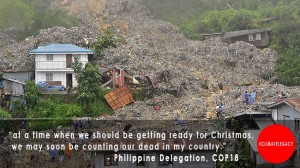by Graham Reeder and Katie O’Brien

As we came to Doha last week, we were fully expecting Loss and Damage to be a key outcome of this conference in Doha. Christiana Figueres, the Executive Secretary of the UNFCCC went to the African Meeting of the Ministers of the Environment to encourage them to push for more adaptation outcomes at this COP (mostly because she saw it as the only real deliverable here).
Loss and damage addresses the destruction from climate change impacts, it includes the economic (GDP, structural damage, crop loss, etc.) and non-economic (loss of lives/livelihoods, cultural loss, species extinction, etc.) losses and damages. These impacts are generally categorized into two types for simplicity: slow onset and extreme events. Slow onset events are ones that gradually cause damages, events such as sea-level rise, ocean acidification, desertification, glacial retreat, etc. The element of time does not necessarily make these events any less pertinent or serious to those who are the most at risk. Extreme events are the ones on the news, natural disasters such as hurricanes/cyclones, heat waves, droughts, floods, etc. These extreme events have a more visual and immediate effect and thus often get more traction within the policy realm.
Not all countries are equal in climate, size and geographic location, so naturally we will see different effects in different countries (i.e. drought in Australia and floods in Pakistan). The inherent vulnerabilities of these countries are not the causes of losses and damages and cannot be used as a way to ignore the impacts of historical emissions. In general, the countries with the highest risks of loss and damage are the ones who have contributed the least to climate change.
Given all that, all developing countries came to Doha saying strongly that a mechanism to address compensation for these losses and damages is necessary. This is based on both a legal obligation for countries not to cause harm to another’s environment, and a range of human rights obligations to prevent and protect against loss of the rights life, shelter, and self-determination, among other rights. Negotiations on this quickly went into closed meetings so that negotiators could thrash out an agreement, which has just been reported on in Saturday’s final Subsidiary Body for Implementation plenary. Given what is on the table, the situation is dire. After nearly 20 hours straight of negotiation all night on the issue, there is still no agreement about creating a mechanism, and the text still hasn’t firmly outlined steps forward in the next phase of the work programme to create a mechanism. Developed countries have essentially imposed more talk-shops on these negotiators, and meanwhile, the world burns.
In today’s Ad-hoc Working Group on Long-term Cooperative Action informal session developing countries came out strongly, saying that a mechanism is a must have for an agreed outcome at this COP. This issue is being bumped up to ministers as they fly in from around the world, signalling that this will be one of several key issues as they hash out the political deal that comes out in the next few days. We hope that this issue doesn’t get swept under the wayside in during other debates about finance and carbon markets. We will keep you posted as things progress.
Update (noon Wednesday): As of this morning, the United States is currently the only country blocking a mechanism on loss and damage, the entire developing world is standing together on this and other developed countries are standing asside. Meanwhile, the United States is stubbornly blocking this issue, mostly because they know that they are directly liable for these impacts and want to shirk any responsibility for them. We will be pushing in the next few hours and days to isolate the US and force them to decide whether or not they want to be on the wrong side of history.
Update (post-COP):The US was successful in watering down the outcome but still managed to save face on the issue. The final outcome was a plan to develop something next year that could be a mechanism, but could also be something weaker. The US pretended that they were going to block in order to appear to be making a gesture of good will by accepting a text that they had largely written with few concessions on their part. If the US’s action this year were any indication of how they plan to work on this issue, we will see nothing meaningful on Loss and Damage ever, this makes sense, given that that would mean the US taking responsibility for, well, anything.